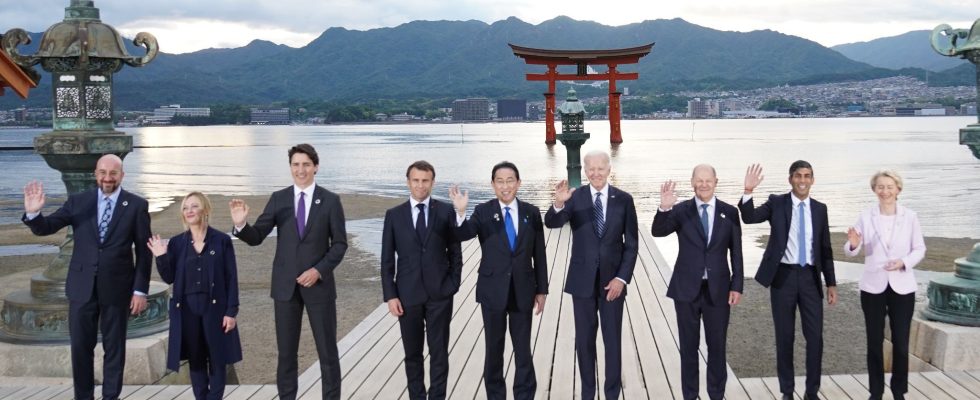The leaders of the G7 meeting in Hiroshima, Japan, on Saturday May 20 called on China to “put pressure on Russia to end its aggression” against Ukraine, while claiming to want “constructive and stable” relations with Beijing.
“We are ready to build constructive and stable relations with China,” the heads of state and government of the seven most industrialized democracies, including the United States, Japan and France, said in their statement, referring to ” the importance of frank dialogue” with the Chinese authorities.
This declaration is the result of negotiations between countries such as the United States, who have a firmer position, against the backdrop of growing tensions with China, and others, on the European side, who insist on avoiding any climate of “confrontation”. with the Asian giant.
“We call on China to dialogue with us”
“It is necessary to cooperate with China, given its role in the international community and the size of its economy, on global challenges as well as in areas of common interest,” said the G7, meeting since Friday and until See you on Sunday in Hiroshima.
“We call on China to dialogue with us, including in international forums, on topics such as the climate and biodiversity crisis,” added the G7.
But at the same time, the major Western powers and Japan are warning the Chinese authorities on several points. “We call on China to put pressure on Russia to end its military aggression and immediately, fully and unconditionally withdraw its troops from Ukraine,” the G7 leaders insisted.
Beijing indeed remains a close ally of Moscow and has never condemned the Russian invasion. “We encourage China to support a comprehensive, just and lasting peace based on territorial integrity”, “including through its direct dialogue with Ukraine”, they continued.
“Opposition” to any Chinese “militarization” in Asia-Pacific
The G7 countries also reaffirmed their “opposition” to any Chinese “militarization” in the Asia-Pacific, assuring that there is “no legal basis” for the country’s “expansive maritime claims” in the South China Sea. .
On Taiwan, they reiterated their call for a “peaceful resolution” of disputes with Beijing, which considers this island as one of its provinces without having yet succeeded in reuniting it with the rest of its territory since the end of the civil war. China in 1949. The position of the G7 members on Taiwan has not changed, they insisted.
On the sidelines of a trip to China in April, President Emmanuel Macron sparked controversy on the Western side by urging Europe not to “be a follower” of the United States or China on the Taiwan question. “We don’t want to go into a block-to-block logic,” he said.
On the economic front, G7 leaders warned on Saturday that any attempt at “economic coercion” would have “consequences”, implicitly targeting China’s practices but without naming it. “We will work together to ensure that attempts to use economic dependencies as a weapon” are “doomed to failure” and have “consequences,” G7 officials said in a statement.
“We express our deep concern about economic coercion” which not only harms international trade but “also undermines the international order based on respect for sovereignty and the rule of law and ultimately , undermines global security and stability,” they added. The G7 is particularly concerned about its vulnerability in strategic sectors such as essential minerals, semiconductors and electric batteries
